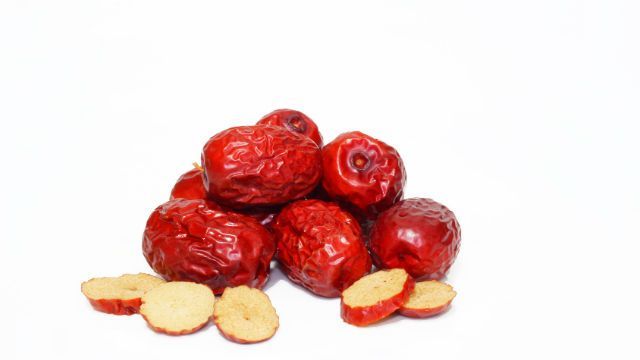
The first image that may jump into your mind when you hear the word “jujube” is that of the chewy colored candy that often gets stuck in your teeth and may have been the culprit of more than a few childhood dental woes. But real jujubes are a 4,000 year-old berry that the ancient Chinese people have been cultivating for centuries.
Sometimes referred to as Chinese, Korean or Indian dates, over 400 different varieties of these small grape to strawberry-sized fruits exist, each one unique in its own way. Jujubes grow on small deciduous trees. The fruit itself is considered a drupe since it contains one central seed or pit.
The crisp texture and tangy sweet flavor is often compared to that of an apple, though some varieties are cultivated purely for drying purposes while others are meant to be enjoyed fresh.
In fact, when jujubes were first introduced to America in the 1800s they were were far from popular as people tried to eat fresh a variety best enjoyed dried. It wasn’t until over 100 years later that a different variety made its way across the ocean that people were able to experience the delicious flavor of this unique fruit.
While all fruits and veggies come with numerous health benefits, jujubes are unique in that they are known for being an excellent source of several nutrients rather than boasting a high concentration of merely one or two. They contain 20 times more vitamin C than any citrus fruit as well as calcium, niacin, phosphorous, copper, manganese and iron.
Along with being a highly concentrated source of several nutrients, jujubes also help protect your skin from the ravages of the sun. A recent study indicated that the isolated deproteinized polysaccharide of the jujube had an antioproliferation effect on melanoma cells. This finding may help scientists develop treatments incorporating the berry’s potent compounds.
And if you’re having a hard time with regularity, as many with a poor diet do these days, incorporating a handful or two of these red gems may just do the trick. For centuries people used jujubes as a means of treating numerous digestive woes including everything from constipation to diarrhea.
In a recent controlled study, individuals suffering from chronic constipation experienced significant relief after 12 weeks of recieving a liquid jujube supplement as compared to those receiving a placebo.
And there’s copious research dedicated to the numerous antioxidant benefits of the century-old berry with the highest concentration of antioxidant compounds located in the skin (another reason to always buy organic).
 Yet even when applied topically, the jujube supplies healing powers. A 2010 study found that when applied topically, the essential oil of jujube seeds was able to initiate hair growth in mice.
Yet even when applied topically, the jujube supplies healing powers. A 2010 study found that when applied topically, the essential oil of jujube seeds was able to initiate hair growth in mice.
With over 400 varieties available, it’s not always easy to know which berries to choose. The Sugar Cane, Li, Sherwood and Chico varieties are best enjoyed fresh while the Lang or Shanxi Li are more commonly found in the dried fruit department. Regardless of fresh or dry, jujubes offer a unique blend of nutritional benefits that can’t be beat.
-The Alternative Daily
Sources:
http://www.ncbi.nlm.nih.gov/pubmed/21820868
http://foodfacts.mercola.com/jujubes.html
http://www.ncbi.nlm.nih.gov/pubmed/20206225
http://www.ncbi.nlm.nih.gov/pubmed/19142004
http://www.sciencedirect.com/science/article/pii/S0278691510001602
http://www.sunstarherbs.net/Jujubes.html

